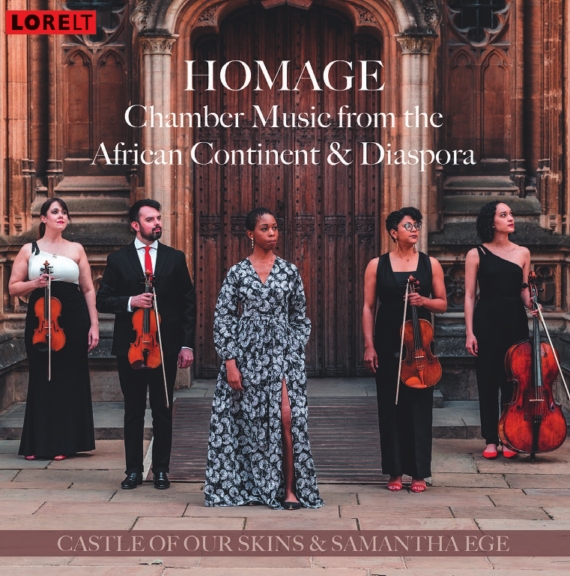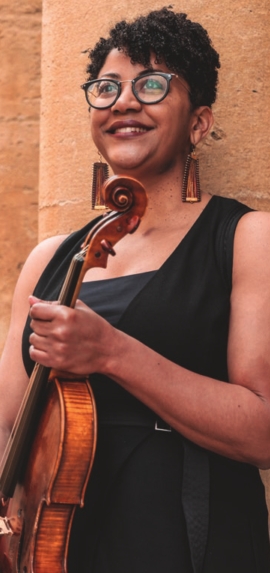
Castle of Our Skins recently released a debut album of
classical music written by five Black composers from Africa and the
African diaspora.

Ashleigh Gordon, violist and founder of Castle
of Our Skins.
Local Black arts institution released debut album
Castle of Our Skins, a Boston-based Black arts institution, is celebrating its 10th year of shining a light on Black composers. The group recently released a debut album of classical music written by five Black composers from Africa and the African diaspora. Titled “Homage,” the album includes work from Bongani Ndodana-Breen, who reflects on his home of South Africa; Undine Smith Moore; Zenobia Powell Perry; Frederick C. Tillis; and Samuel Coleridge-Taylor.
Each composition on the album offers commentary on history as well as homage to the struggles and resiliencies of individuals who participated in changing societies.
Zenobia Powell Perry’s composition pays homage to William L.
Dawson, a composer whose work arranging African American spirituals is still utilized in musical performances. Titled “Homage,” Perry’s piece, according to the “Hidden Voices!” project at the University of Colorado, is based on the spiritual “I’ve Been Buked and I’ve Been Scorned,” which is played unaccompanied at the beginning of the piece.
Castle of Our Skins was founded by Ashleigh Gordon, a violist and social activist, to create what she terms “a platform to highlight Black creatives.” As artistic director, Gordon draws inspiration from poetry that she then applies pragmatically.
The organization takes its name from “Poem for Nina,” a Nikki Giovanni poem referencing Nina Simone, Gordon tells the Banner.
“To paraphrase,” Gordon says, “she writes that if we are imprisoned in our skins, we will treat our skins like a palace.”
George Lamming used similar phrasing in the title of his classic novel, “In the Castle of My Skin,” which describes life in Barbados in lyrical terms.
“We are musically a program of the African diasporic tradition,” Gordon says, “and utilize visual art, dance, the spoken word and music to place Black history in our programs.”
Castle of Our Skins’ numerous upcoming projects include “A Spiritual Fantasy,” a string quartet pre-concert on March 4 at the Boston Conservatory at Berklee before a Boston Symphony Orchestra performance highlighting Black composers; a Project STEP concert at Rockport Music Shalin Liu Performance Center on March 12; the Black Student Union Intercollegiate Festival “Black Futures” concert at Boston Center for the Arts on April 1; and a multimedia project premiere, “It Must All Be Done in Darkness,” celebrating abolitionist and writer Harriet Jacobs at the Boston Center for the Arts Plaza Theatre on April 15.
Educational projects are also fundamental to the group’s mission. Castle of Our Skins personnel wrote the curriculum guide to Anthony Davis’ opera, “The Life and Times of Malcolm X,” produced by the Boston Modern Orchestra Project (BMOP). Longer-term projects include a three-year collaboration with the Boston Public Schools and Rising Tide Music Press that, according to a COOS press release, will commission 18 African diasporic composers to create new works for young musicians and will result in 18 compositions for beginner/ intermediate K-12 wind, string and choral ensembles; culturally responsive STEAM-based curriculum guides to accompany each new work; and global availability to scores and teaching guides through Rising Tide Music Press publication.
Gordon works outside of Castle of Our Skins, too. As a musician, she performs with Shelter Music Boston, an organization that presents classical chamber music concerts in homeless shelters and other shelter environments.
“I am always evolving and growing,” Gordon says.
ON THE WEB
Castle of Our Skins www.castleskins.org